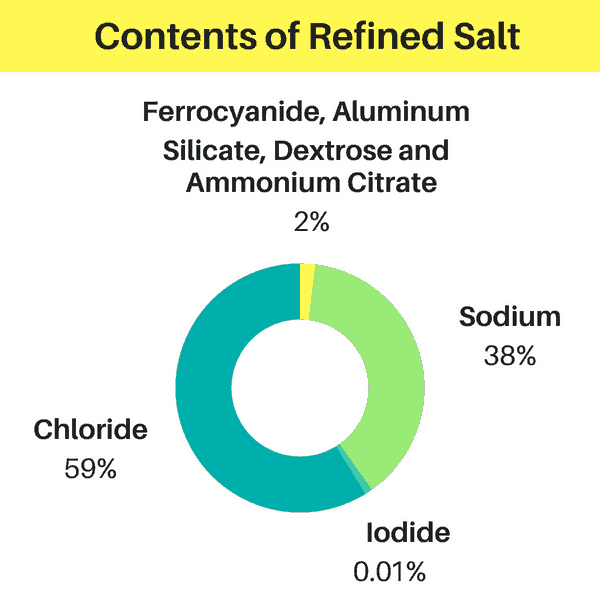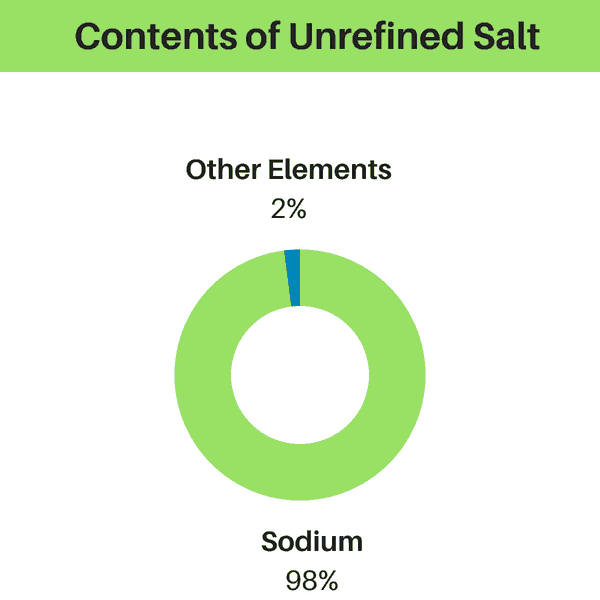Today’s diets blame salt for chronic diseases, high blood pressure, and hypertension. They claim a major decrease in salt will cure these problems. However, salt is an essential nutrient that every living creature needs in order to survive. What we have discovered in macrobiotics is that not all salt is bad and too little of salt is just as harmful as too much. Instead, salt should be evaluated on what type of salt is used, refined salt or unrefined sea salt, and when salt is added to food. This will determine if the salt will be harmful or beneficial to the body.
What is Refined Salt?
Refined salt or table salt is sodium chloride that has been stripped of all minerals and elements. It is brined in sulfuric acid or chlorine, added with anti-caking chemicals, and bleached. This means refined salt has extra additives and harsh chemicals that are not natural. If the salt is unnatural then the body cannot use it to perform vital functions.
On top of it, refined salt is heavily added to processed foods. The over processed foods and refined salt increase toxins and acidity in the body. That acidity decreases your health by weakening the immune system making you vulnerable to health issues such as high blood pressure and hypertension. That is why it is important to not get rid of all salt but decrease intake of refined salt by eating less processed foods.
- Sodium: 39%
- Chloride: 60%
- Iodide: .01%
- Ferrocyanide, aluminum silicate, ammonium citrate, and dextrose: up to 2%
What is Unrefined Salt?
Unlike refined salt, unrefined sea salt is a whole product that can be utilized by the body. Sea salt is evaporated from sea water and washed. It is never exposed to harsh chemicals, therefore, the natural minerals and elements stay intact. Also unrefined sea salt is stable and balanced. That balance from the sea salt is transferred to our bodies and helps our blood to have an alkaline condition instead of acidic. This improves our immune system and healing ability.
- Sodium: 98.32%
- Calcium: .4%
- Potassium: .12%
- Sulfur: .11%
- Magnesium: .1%
- Other elements Phosphorus .005%, Iodine .002%, Manganese.0015%, Copper .001%, Zinc .0006%
Refined Salt vs Sea Salt
Cooking with Sea Salt
Not only does the quality of salt matter but also incorporating unrefined sea salt to the food during cooking is essential. Adding the salt while cooking, allows the sea salt to blend and bring out the natural flavors without increasing your blood pressure. Never add salt after cooking or while eating.
Benefits of Sea Salt
The benefits of sea salt include balance of blood fluids, prevention of low blood pressure, prevention of dehydration, ability to transmit nerve impulses, allow nutrients and oxygen to travel to destinations, keeping bones strong, and improving immune system. Additionally, salt is necessary for the digestion and absorption of carbohydrates.
How Much Sea Salt Should You Consume?
This is a harder question to answer because It depends on your body and how much salt you have consumed in the past. It is essential to balance salt because too little and too much of salt is bad. We recommend slowly decreasing processed foods and refined salt. Start with replacing one processed meal a week for one healthy dish that has sea salt. (Check out our healthy vegetable nishime recipe)
At Strengthening Health Institute, we teach how to listen to your body, meal planning, and cooking to assist you in becoming healthier, physically and mentally. When people first transition from an animal and dairy food diet, their salt capacity is very low because of residual salt from meat and cheese especially. However, over time, we eliminate those foods and our need for salt increases.
What is Macrobiotic Salt?
The term “macrobiotic salt” means that the salt is sourced from largely unpolluted water (because there really isn’t any truly clean salt due to microplastic contamination across the globe). Additionally, macrobiotic salt is unrefined and naturally processed twice through evaporation. Sea salt is simply a replica of the ancient sea and shouldn’t include any additives or unnatural refinements. The balance of minerals in the sea has remained relatively stable.
We recommend unrefined white sea salt and our favorite brand is SiSalt. A high quality unrefined sea salt has two important characteristics. The first is that it tastes sweet on the tongue before tasting salty, and the second is that it has a very soft rather than harsh quality. These two things are a reflection of the salt’s ability to be absorbed and utilized properly. You can usually tell right away when you are using refined salt because it tastes very salty and harsh.
Check out all of our macrobiotic course to get started.





SHI relies on your support.
This content is possible because of donations from people like you. If you valued this article then take a moment and make a donation to benefit the SHI community. Any amount truly makes a difference.
Give $25, $50, $75, $100 or a different amount that makes sense for you.
Donate Now